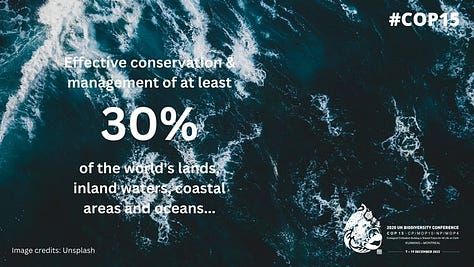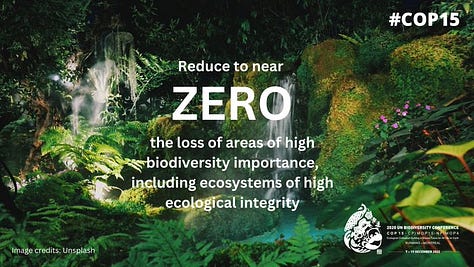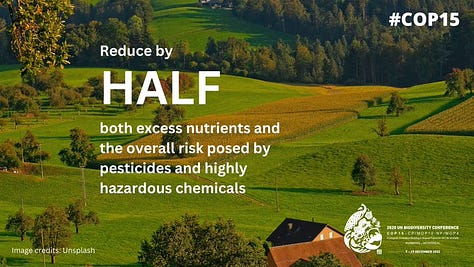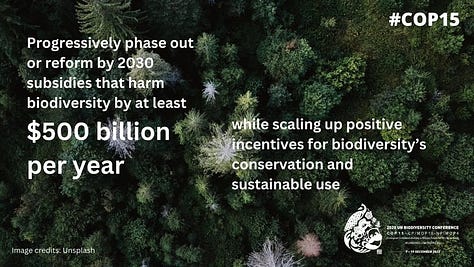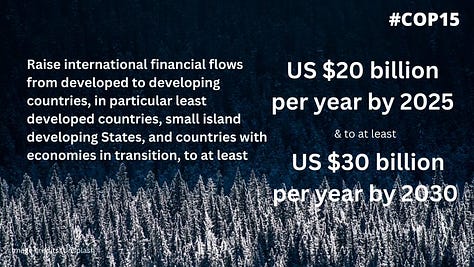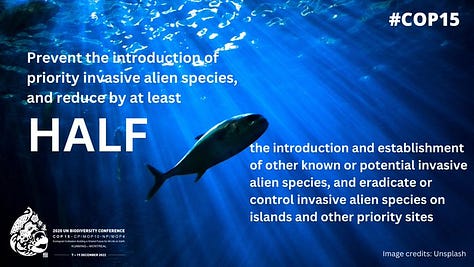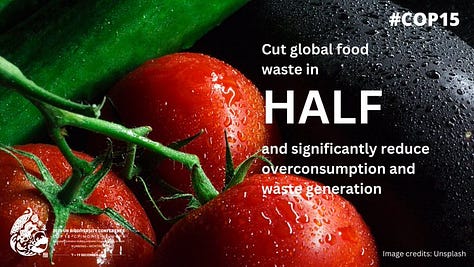Global Biodiversity Framework sets new standard for stewardship of nature
United Nations Biodiversity Framework, agreed by 190 nations in Montreal, establishes global ambition to protect 30% of land and water by 2030, halt mass extinction, and safeguard critical ecosystems.
Citizens' Climate International welcomes the "pact with nature" agreed in Montreal in the early hours of Monday, Dec 19. The Kunming-Montreal Agreement brings 190 nations into a Global Biodiversity Framework to protect 30% of the world's lands, coastal areas, inland waters, and oceans, by 2030.
We also want to express our appreciation for the hard work of so many scientists, advocates, and negotiators. Many have worked tirelessly for years—or decades—to secure this global agreement on the restoration and conservation of nature.
The Global Biodiversity Framework is built around four core goals:
GOAL A: Restore and conserve nature, ecosystems, and biodiversity, while halting mass extinction.
GOAL B: Sustainably use and manage biodiversity and nature, for the benefit of present and future generations.
GOAL C: Fairly and equitably share benefits, including monetary and non-monetary, genetic and digital sequence information, and traditional knowledge.
GOAL D: Provide adequate means of implementation—financial, capacity-building, technical and scientific, and access to technology.
Action toward this new commitment to protect 30% of land and water, to protect biodiversity, will have far-reaching positive effects—for nature and for people.
Species loss is happening faster than at any time since our species came into existence; mass extinction can be slowed, or even stopped, if the right actions are taken to stop polluting, stop destroying habitat, and stop disrupting the climate and other natural systems.
Loss of biodiversity is one of the converging forces putting global food security at risk. The world has agreed to cut global food waste in half and significantly reduce overconsumption and waste generation; this will allow us to reduce hunger and hardship while reducing the destruction of ecosystems to expand agriculture.
The Framework agreed in Montreal is also historic in its recognition of the need for inclusion, participation, and the active, ongoing defense of human rights.
Target 22 calls for "full, equitable, inclusive, effective and gender-responsive representation and participation in decision-making, and access to justice and information related to biodiversity by indigenous peoples and local communities, respecting their cultures and their rights over lands, territories, resources, and traditional knowledge, as well as by women and girls, children and youth, and persons with disabilities and ensure the full protection of environmental human rights defenders."
Target 23 calls for "gender equality in the implementation of the framework through a gender-responsive approach where all women and girls have equal opportunity and capacity to contribute to the three objectives of the Convention, including by recognizing their equal rights and access to land and natural resources and their full, equitable, meaningful and informed participation and leadership at all levels of action, engagement, policy and decision-making related to biodiversity."
These breakthroughs for inclusion, for the rights of women and girls, and indigenous peoples, and for the protection of environmental human rights defenders, will create a policy environment more favorable to justice and sustainability.
The agreed Framework also calls for:
Reducing to near zero the degradation of high-sensitivity, high-value, and high-integrity ecosystems;
Reducing by at least half the polluting runoff from agriculture, including fertilizers, pesticides, and other chemicals;
Progressively phasing out or reforming by 2030 subsidies that harm biodiversity by at least $500 billion per year, while scaling up positive incentives for biodiversity's conservation and sustainable use;
Raising biodiversity-related international financial flows from developed to developing countries to $20 billion by 2025 and $30 billion by 2030;
Reducing incidence of disruptive invasive species by half and preventing establishment of invasive species in sensitive and vulnerable ecosystems.
Though it has not yet formally ratified the Convention on Biological Diversity, the United States sent a delegation to Montreal, participated in the negotiations, and committed to support implementation of the Framework. This is one among a growing number of signs that nations, industries, and financial institutions understand that leading on nature protection is inherent to mainstream legitimacy in the 21st century.
The Agreement calls for $200 billion per year by 2030 to restore and protect nature.
This will be reinforced by the global agreement to require large and transnational companies and financial institutions to track and report biodiversity risks and impacts throughout their supply chains and portfolios.
New financial practices and related business model innovations will make sustainable solutions an everyday reality for billions of people currently priced out of the sustainable economy.
In Montreal, CCI and our global community of volunteers were represented by Cathy Orlando—CCI Program Director, long-time Canada Manager, and a Women7 Advisor—and Gloria Bulus—the volunteer leader of CCI Kaduna, in Nigeria.
Their presence was critical for connecting with stakeholder networks and keeping human rights and high ambition centered in the process.
CCI will be keeping a close eye on efforts to expand benefits to youth, women, vulnerable communities, and indigenous peoples, as part of the wider justice work linked to the Global Biodiversity Framework.
Other team members remotely joined workshops to map out climate and biodiversity work over the coming year.
The committed restoration and conservation of nature is crucial for reducing vulnerability and instability and securing a livable future for people everywhere and for countless generations to come.
Gallery of Major Achievements at CBD COP15
